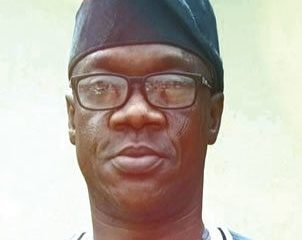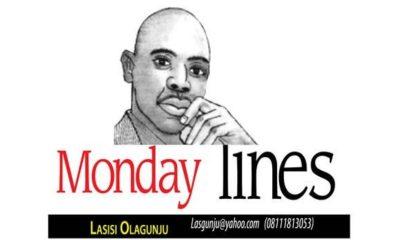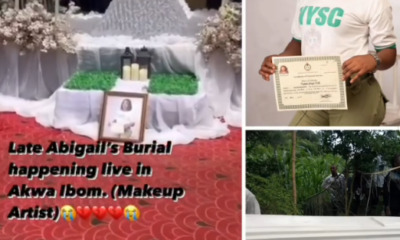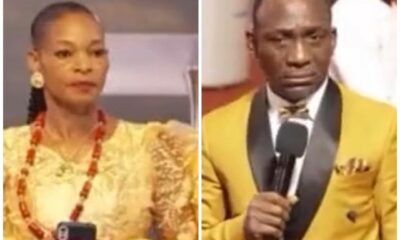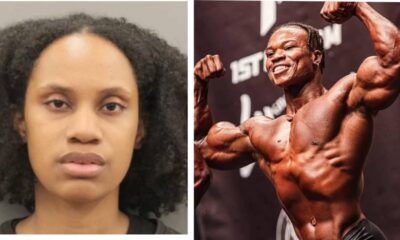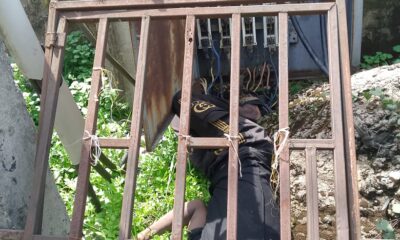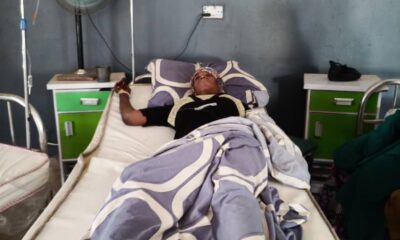Opinion
OPINION: Tinubu And The Ways Of The Wasp
Published
1 year agoon
By
Editor
By Suyi Ayodele
There are two insects in Yoruba cosmology that are similar. But they are very distinct. One is oyin (Bee). The other is agbon (Wasp). Both equally sting in their unique ways. Oyin, for instance, is less aggressive and stings only when it is threatened or comes under immediate danger. It is an insect that is naturally defensive; it stings once. On the other hand, agbon is very aggressive, territorial, domineering and controls its space. It suffers no incursion and intrusion into its space. While oyin and agbon live in almost similar nests (with oyin’s own a bit concealed), agbon openly displays its abode, daring anyone to come near it. Now, when these two insects set out to fight, oyin stings and leaves marks of the attack on its victims. That is not the way of agbon. Agbon deposits its poison in its nest and when it wants to use it, it goes back to the nest, uses its buttock to collect the poison and deposits the toxic material into the bloodstream of its victims. Agbon stings multiple times. Victims of agbon stings live in pain for days! Again, Yoruba describes such a fighting strategy in a proverb: “Ile ni Agbon ma nko idi si ko to ta – the wasp goes back to its nest before it stings. The’ home’ (nest), to the wasp, is its ultimate strength.
The Yoruba worldview is mythical. Nothing happens to that Race by happenstance. Generally, Africans are esoteric; but the Yoruba people are in a class of their own. An average Yoruba person places a premium on his/her home. Ile ni abo simi oko – everyman retires home after the day’s work on the farm. Home (Ile) is literal and metaphoric in this sense. Whenever a man draws strength from his cultural background, the Yoruba people say “o pada sile” (he has gone back home). So, Ile does not have to be the physical structure. Most often than not, when a man has troubles navigating the turbulence of this world, he goes back home. There is a saying that captures that: “ode ma nle ómó pada sile” – the outside chases a child back home. When it is tough outside, the Yoruba encourages the child to go back home. Why do they give such counsel?
FROM THE AUTHOR: OPINION: Between Atta Ebira And Ohinoyi Of Ebiraland
Bola Ahmed Tinubu, the presidential candidate of the ruling and ruining APC, went back home last week. If I were him, I would have started my last Wednesday presidential campaign in Abeokuta, Ogun State capital, with a proper Ijuba (reverence) for my forebears. I would have chanted: Baba mi Oloyeloogun okun o (Greetings to my fathers the ones who double as wizards and sorcerers). I would have called them their names as: Osoogun sule, soogun saja (He who keeps his sorcery at home and in the ceiling). I would have told the crowd why my forefathers behaved that way – k’Oso ule ba mu tule, ko mu toke aja a gbe omo re (so that if the wizards within take hold of the charms in the house, you use the ones in the ceiling to avenge your child). I would have told my forebears why I embarked on the Ijuba by reporting my traducers to them thus: Oso ule tii hi kesiri omo re (the wizards at home are already troubling your child); Aje ule tii hi kesiri omo re (the witches at home are already pummeling your child).
I would follow that with an Ofo (Invocation) that those sages taught me; to wit: Hin wi ki mi ba ti ri han (You said when I see them – wizards and witches). Ki mi wi a si han (I should tell them). Apa beri ni ti oka (When you kill the cobra, you cut off the head). Apa laya ni t’ere (When you kill a python, you slit the bowel). A little Ogede (Incantation), declaring the impossibility of their gang up against me would follow. I would have told my political enemies, within and without, that: Ha mu agada muni duro de Erin (Nobody holds the short sword to await an Elephant). If you like, take that to mean the hoarded petrol. Han mu kumo sona hi de Efon (Nobody holds the cudgel to confront a buffalo- the redesigned Naira). Han mu obe usijele dani de Ekun (Nobody holds the blunt common knife to fight the leopard – BVAs and other reforms in the electoral process). Having done those ones, I would then call my sidekick and minstrel, K1 De Ultimate, Wasiu Ayinde Barrister, to go esoteric by chanting Ayajo (Evocation) on those who have elected to truncate my presidential ambition. The last act would have been for K1 to sing Orin Ote (Rebellion songs laced with proverbs). Whenever there is a discord, every song becomes a proverb (Ija de; ori di owe), our elders say.
Then, finally, I would address the people; my people, in their own language, irrespective of the presence of those who don’t speak the Yoruba language. A masquerade is addressed by the language he understands. I will tell my people my pains and let them know that I belong to them the way the rag belongs to the dunghill (t’eni ni t’eni, t’akisa ni t’aatan). The matter at hand requires the support of my people. Tinubu did virtually everything I said here except the Ijuba, Ofo, and Ogede. And truth be told, Tinubu’s travails in the hands of his ‘friends’ have gotten to a level that the cosmic must be invited. I appreciate that in his Wednesday outing. He could not have been otherwise. For the first time, and by my reckoning, Tinubu acted like a proper Yoruba man. I love his bi yio d’ogun, ko d’ogun; bi yio d’ote ko d’ote – if it turns out to be war, let it be war, if it turns out a revolt, so be it – posture. His goat has been pushed to the wall, Tinubu must turn back and bite.
Ahmed Tinubu did exactly what a wasp does that Wednesday. He was very dramatic about it. The APC presidential candidate in the February 25 election, is a man that this era will not forget in a hurry. I am beginning to pay more than passing attention to his political trajectory, especially as his “life-long presidential ambition” is concerned. Between June 2022 and Wednesday last week, Tinubu has brought to the fore the relevance of home in the Yoruba configuration, more than anything else. “Ile ni Ile nje” – home will always be home – is the message that I am getting from the former governor of Lagos State. At the heat of the APC presidential primaries last year, I had a discussion with a very elderly friend. The old man expressed the wish that Tinubu would drop his presidential ambition for a younger Yoruba man (he mentioned three names). He asked for my opinion on that wish. My answer was simple. You don’t advise a man not to aspire to take his ancestral chieftaincy title. We argued if the Nigerian presidency is an inheritance and I answered in the affirmative. The old man said I was wrong and lectured me on politics and intricacies of power. I listened to him.
When on June 3, 2022, Tinubu uttered that statement which was pregnant with an entitlement mentality to wit: “E gbé kinni yi wa, èmi lókán” (bring the thing, it is my turn), I called my elderly friend to remind him of our discussion. Tinubu chose Abeokuta, the capital of Ogun State to utter the quoted words. It was at a time when the threat to his ambition was at its highest decibel. He had toured virtually every state of the Federation without causing any uproar. But when he realised that some elements within the APC, led by the Aso Rock Villa cabal, were about giving him the short end of the stick, he went to Abeokuta and spoke. He was strident in doing that. He ensured that Abdullahi Ganduje, the governor of Kano State was present. Tinubu spoke in Yoruba Language in June 2022. Ganduje, a Fulani, could only look on. That is called “figure it out”. And Aso Rock got the message. The APC presidential primaries’ field was left ‘plain’ thereafter. Tinubu won the crown. But will ascend the throne?
Now the real election is around the corner. But Tinubu has been running around like the candidate of the opposition party. He gets little or no support from his ‘friends’ he helped to power. Just as Tinubu said in June 2022, but for him, General Muhammadu Buhari would not have been president. What did Tinubu do to ‘install’ Buhari as president? Simple. The Lagos big man assembled the most vicious arsenal against the then president, Goodluck Ebele Jonathan. From outright lies to propaganda, intimidation to blackmail, Tinubu and his gang railroaded Jonathan out of Aso Rock Villa to his Otuoke waterside country home. The heat was so much that even before the last ballot was counted, Jonathan was already in Bayelsa State. The Tinubu propaganda machinery told Jonathan that there would be bloodbath should he win the 2015 presidential election. The Izon man went philosophical. “My ambition is not worth the blood of any Nigerian”, he sang. Even when the card reader would not recognise his thumb and those of his family members, during the voting, Jonathan did nothing.
Jonathan eventually voted and ‘lost’ the election eventually, too. Ever since, vessel-loads of the blood of Nigeria has been shed and we move on as a nation as if nothing has happened. One of the greatest weapons the Tinubu Mafia used to undermine Jonathan administration was artificial petrol scarcity. The agonies Nigerians went through to buy the commodity pre-2015 elections were such that anybody else could have defeated the then ruling PDP. Little wonder that Tinubu became agitated when he started seeing queues at filling stations across the country, weeks to his own election. A man who kills by the sword does not like anyone to take a sheath near his neck. It is therefore not out of place for Tinubu to have labelled those behind the current fuel shortage as enemies of his ambition. Tinubu knows them to be the thieves within.
But the fuel issue is not the only worry of the lord of Lagos. Like any normal human being, Tinubu could not understand why the government of Buhari would choose an election year to change the colour of the highest denominations of the nation’s currency. The man was upset such that he described the Naira redesigning as mere painting. He was angry at his frustration in the hands of his ‘friends’. He said he was coming with a revolution. Baba Bisi Akande, former governor of Osun State, tried to caution him. Tinubu asked the crowd to tell the elderly ones around him on the podium to allow him to speak his mind. And in speaking his mind, Tinubu told his ‘enemies’ that even if they changed the “ink” on the Naira, or, if they liked, they could spend and become bankrupt, he would win the election.
The use of “ink” is deliberate. Nothing fundamental was changed in the so-called redesigned Naira note. A good elementary Fine Arts teacher, doing dye and tie, would do a better job. And there was no mistake about who Tinubu was talking to. The scarcity of fuel is a problem of the APC government which he foisted on the entire nation. The redesigning of the currency is the policy of his ruling party. The inability of the citizens to swap their old currency notes with the new ones is a hungry monkey that only the Buhari-APC led government can find enough bananas to feed. One can therefore understand why Tinubu’s megaphone, The Nation newspaper, the following day came with the interpretative headline: “Tinubu: fifth-columnists behind petrol scarcity, naira redesign row”.
READ ALSO: OPINION: My Magun Experience
Tinubu knows that he has vicious enemies within the APC. That is why he called on K1, in Abeokuta, to beat the drumbeat of rebellion and lace it with “Ayajo nla” (big evocation) over their heads. That he called for ayajo is very instructive. Among the Yoruba esoteric cult, the most feared is the man who is very versed in Ayajo. Ofo, Ogede, Aasan and Ayajo may be esoteric siblings, but Ayajo is far ahead of them and is dreaded among its other siblings. Ayajo brings to bear what is not. It goes to the “isedale” of the object (the source). It traces the history, the event itself and the consequences that followed and asks for a repeat of the feat. When you see a man with a good sense of ayajo, run! And Tinubu, I dare say, is justified to have asked for Ayajo at this time. His traducers deserve such!
How do you reconcile the fact that of the 36 states of the Federation and the Federal Capital Territory (FCT), Tinubu’s president and leader of his party, Buhari, would only feature in only 10 states! That is outlandish! Of the 10 states, Buhari was scheduled to be in Ilorin, Kwara State but he chose to go for a ‘peace Award’ in Mauritania. He was billed to be in Abeokuta last Wednesday, but Buhari left Lagos for Dakar, Senegal. Buhari accompanied Tinubu to Bauchi on January 23, but he said nothing. Why? They said the sound system went bad. Phew! Sunday, January 29 was for Sokoto, but that did not hold, probably a change in the timetable. Yesterday, Monday 30, was the turn of Akwa Ibom State. Buhari was nowhere near the venue of the rally to canvass votes for his candidate. Ask again, how many states has the APC National Chairman, Abdullahi Adamu, gone to with his presidential candidate? Is this how to reward a man, who came to you and said, “weep no more, we will support you and you will win” and made you win the presidency after three unsuccessful attempts? The coming weeks and days are going to be very interesting.
Suyi Ayodele is a senior journalist, South-South/South-East, Editor, Nigerian Tribune and a columnist with the newspaper
You may like

By Suyi Ayodele
Date was Monday, August 29, 1955. Oba Isaac Babalola Akinyele, the Olubadan of Ibadanland, sat on his throne. There was an august visitor to be received by the monarch. He had in attendance some of his prominent chiefs like the Otun Olubadan, Chief Kobiowu, and the Ashipa Olubadan, Chief Akinyo. From the political class, Oba Akinyele invited the colourful Adegoke Adelabu of the Penkelemesi fame. It was an important occasion for Oba Akinyele. One of his subjects, a woman of no mean repute, had requested to see the monarch. Adunni Oluwole was not just an Ibadan indigene. She was a force among the political elite of her time. Her pint-size notwithstanding, Adunni was a political juggernaut; she had her own political party, the Nigerian Commoners Party (NCP). The clamour for independence was at its highest then. Adunni Oluwole was futuristic. She suspected that if given independence, the majority of Nigerians would suffer in the hands of the few that would take over from the colonial masters. So, while others were asking for independence, Adunni was of the opinion that the British should not hand over power until the masses were bold and educated enough to confront the monsters that the political class represented. To achieve her aims, she moved from one palace to the other: from one town to another, canvassing and mobilising the people against the clamour for independence. The Yoruba called her party Egbe K’Oyinbo maitiilo.
In the course of her crusade, Adunni wrote to Oba Akinyele, seeking the permission of the Olubadan to come and address Ibadan people on why they should not support those asking for independence. On her arrival, Adunni told Oba Akinyele and the people gathered that if the whites were chased away and the politicians took over from them, the common people would suffer untold hardship. To avoid that, she asked the Olubadan to use his influence and mobilise his subjects not to support the transfer of power from the British colonial masters to the Nigerian slave drivers. But she was not allowed to finish her message. Chief Adelabu (Penkelemesi) was reported to have interrupted her abruptly, almost to the point of physical assault before Oba Akinyele restrained him. Oba Akinyele recognised the toughness of Adunni’s resolve, but nevertheless asked that Adunni should be taken out of the palace and banished her from ever entering the palace. The late Professor Kole Omotoso recorded Adunni’s encounter with Adelabu in a more dramatic form in his book, one of the most authoritative documentations of Nigerian politics, Just Before Dawn (page 200-201). Omotoso called the book faction (fact and fiction). But the Adunni story is fact. Though she died before Nigeria gained independence, events after the 1955 episode have since justified Adunni’s prediction that after independence, a few would become masters and dictators over the majority.
FROM THE AUTHOR: OPINION: Bobrisky And Our Other S/He Offsprings
The Yoruba political, social and cultural set up is egalitarian in nature. It is a race known to have given equal opportunities for both sexes to actualise their potential. In the traditional set up, the position of Iyalode (leader of the women folks), has been as prominent as that of any male chieftaincy title. In some Yoruba towns and villages, occupants of the Iyalode chieftaincy play important roles in the selection of obas. This also underscores the respect accorded women on esoteric matters because the women folk are regarded as an important part of the tripod which governs an average Yoruba community (Oba-in-council, the awos and the owners of the night- our mothers). It is therefore not out of place for women in Yorubaland to rise and speak whenever occasion demands. The likes of the legendary Efunsetan Aniwura, the Iyalode of Ibadan (1829-June 30, 1874), Efunroye Tinubu (1810-1887),; Iyalode Bisoye Tejuoso (1916-1996); Chief (Mrs.) Funmilayo Ransome-Kuti (1900-1978); Mama Hannah Idowu Dideolu Awolowo (1915-2015), who after the passing of her husband, Chief Obafemi Awolowo in 1987, held the Awolowo political dynasty and the entire Yorubaland intact, and the most recent, Iyalode Alaba Lawson (1951-2023), came to mind as some Yoruba matriarchs who used their positions, positively, to project the Yoruba nation to the world.
With the rich culture of decency that the Yoruba women folk have attracted to themselves and the race, one cannot but be worried that in the 21st century, a Yoruba woman can afford to wage a senseless war against her land under the guise of fighting for an independent nation for the Yoruba race. I am talking here about the last Saturday invasion of the Oyo State Secretariat by some miscreants who claimed to be soldiers fighting for the actualisation of an independent Yoruba nation. More appalling in the whole meshugaas, is the claimed declaration of the Democratic Republic of Yoruba (DRY), by Modupe Onitiri-Abiola, who claimed to be one of the widows of MKO Abiola. Shortly after the invasion of the Oyo State Secretariat, Onitiri-Abiola’s video of the declaration of her fanciful DRY hit the internet.
In the four minutes and forty-two seconds video (the version i got), the woman said among other things, in plain Yoruba Language: “We are indigenous people. We are sovereign people; we are ethnic nationalists. We have decided to secede from Nigeria on November 20, 2022. And today, April 12, 2024, we decided to finally leave Nigeria. I, Modupe Onitiri-Abiola, proclaimed the sovereignty of the Democratic Republic of Yoruba today, Friday, April 14, 2024. From today henceforth, Yorubaland has commenced its own republic. By that virtue, it has now become the newest nation in the world…” The video was obviously recorded a day before the invasion of the secretariat. After watching the video, I have been trying to situate what actually prompted her and her backers to embark on such a mission at this point. I have been trying to fathom which Yoruba nation she was talking about. I checked her pedigree; the only thing I could get is her conjugal relationship with the late MKO. So, I asked myself: being Abiola’s wife is now a qualification for one to lead the Yoruba race? Nnkan mà se wa o (something terrible has happened to us)!
FROM THE AUTHOR: OPINION: Can I Tell Our First Lady That Graduates Drive Cabs Here, Too?
No doubt about the fact that Nigeria, as it is composed now, needs restructuring. Nobody, especially anyone who has been following the political trajectory of Nigeria since the collapse of the First Republic on January 15, 1966, will be comfortable with the way things are in the country. The current political dispensation has, since its inception on May 29, 1999, foregrounded, more than any administration before it (civilian or military), those things that divide us more than any hope of unity. The eight years of Muhammadu Buhari in the saddle between May 29, 2015, and May 29, 2023, projected a part of the country above the rest of the nation. The Bola Ahmed Tinubu administration that took over on May 29, 2023, has not fared better. Rather than address the agitation of imbalance in the appointments of personnel into key areas of government that characterised the Buhari government, Tinubu too has gone a notch higher with his one-sided appointments. If Buhari was accused of Fulanising governance to the detriment of other ethnic nationalities, President Tinubu too has shown that he has no fair mind as his Yoruba boys, especially his Lagos and Ogun Alleluyah orchestra, are all over the place. Nigeria indeed has never had it so bad as we have at the moment. The nation needs a surgical restructuring; one that will give equal opportunities to the citizenry without recourse to place of birth, political affiliation and religious creed.
As much as we agree that we don’t have the best of structures at the moment, it is unthinkable that the solution will be a broad day-light secession! The truth is that the last set of nationalists that have ever traversed the Nigerian political landscape were those lofty politicians of the last five years of colonial rule and the first three years after independence in 1960. Before the January 15, 1966, coup led by the late Major Chukwuma Nzeogwu, it was obvious to all discerning minds that Nigeria was “a mere geographical expression”, as espoused by Chief Awolowo in 1947. There is nothing to show that the country has grown into nationhood. Fifty-four years after we fought a needless civil war that claimed over two million lives from both sides, all in a bid to “keep Nigeria one” in spite of the glamourous insertions in our various constitutions- the affirmative cliche of Nigeria being “one indivisible and indissoluble Sovereign State”- we have demonstrated that we have not learnt anything from our history. The elite class has not done anything to promote the unity and oneness of the country. Even the followership, as long as the current events favour us, we don’t give a hoot about how others fare neither do we exhibit any empathy towards those who seem to be holding the short end of the stick in perpetuity. We think more of what is in it for us and our ethnic groups than what is in the overall interest of the nation. That type of orientation breeds nothing but continuous agitation.
FROM THE AUTHOR: OPINION: Kaduna’s Debt And UnEl-Rufaic Silence
When one considers all these, to pray for the oneness and unity of the country becomes an arduous task. Every person of good conscience will agree that Nigeria cannot continue the way it is now. Something must be done to address the various agitations across the nation. When a Fulani man is at the centre, the Yoruba man is not happy. When it is the turn of the Yoruba man, the man up north feels that he is being short-changed. Yet, the third leg of the tripod, the Igbo race, is left in the cold to suffer its fate. We fought a war for 30 months. We ended the war and affirmed that: “there is no victor; there is no vanquished”. Over five decades after the ‘affirmation’, we still see the Igbo as “those who attempted to break away’, and as such, not fit to be number one in the country. This is the kind of feeling that emboldened last Saturday’s thoughtless action of Modupe Onitiri-Abiola. However, we cannot but caution Onitiri-Abiola that this is not how to be a heroine. She could read more about how Mrs. Olufunmilayo Ransome Kuti led the Egba women on October 5, 1946, and Nwanyereuwa, led the November 18, 1929, Aba women’s riots. Those were great women in their own right.
My greatest concern in the current matter is that it happened in Yorubaland. With our sophistication, cosmopolitan outlook and enlightenment, it beats one’s imagination that a group of people would wake up, arm themselves and march to the Oyo State secretariat to “take over” the place. One of the things that came to my mind is that if, for instance, those DRY ‘soldiers’ had succeeded in taking over the Oyo State Secretariat, what follows? Would that have meant that their gang members in Ekiti, Ondo, Osun, Ogun and Lagos States would replicate the same? How many men do they have? What is the size of the arsenals? What a joke! But who do we blame for this charade? How long have we been asking that the Yoruba elders should put their house in order? How long have we been clamouring that Afenifere should detach itself from the apron of Yoruba political marauders- the very ones who believed in restructuring before they got to power but would not touch the same ideology with a 10-foot pole while in government? How did Baba Ayo Adebanjo feel when he read the news of the Ibadan invasion; what agitated the mind of Pa Reuben Fashoranti on seeing the video of Onitiri-Abiola’s ‘proclamation’? Is this the Yoruba of their dreams, a nation without leaders? I would not bother about Professor Banji Akintoye, leader of the Yoruba Nation self-determination group’s response to the Ibadan event. Those sages who warned us not to show the young folks the length of the phallus so that they don’t begin to think that everything that is long is an object of procreation are absolutely right. Like they say on the streets: Akintoye go explain tire.
Above all, the last Saturday incident in Ibadan is a wake-up call to the nation’s leadership. They should be worried that that type of thing can happen in Yorubaland. Whether it resembles ‘gate’, or it does not resemble it, one is advised to set a trap for it (Ó jo gàté kò jo gàté àwòn laa dee de). Who knows who has copied the template? How many of us in Yorubaland ever thought that something close to that could happen in our backyard? When the Indigenous People of Biafra (IPOB) started its agitations, what name did we not call them? The nation must do something before we have a conflagration in our hands. Beyond punishing those behind the Ibadan saga -, and I think they should be thoroughly punished- we must address the factors that are responsible for such reprehensive behaviour. It should not be dismissed as one of those things. It is obvious that Nigeria needs restructuring in all aspects. Any further delay will bring more of Onitiri-Abiola’s type of ‘proclamation’. Truth is, many are waiting in the wings to follow suit. It was the Igbo the other time. It is Yoruba now. Who knows who is next?

By Lasisi Olagunju
The audience at the 1903 (third year) lecture of the Royal African Society in London listened with rapt attention as African nationalist, Dr. Edward Blyden, took them back to antiquity when “the most enlightened nations of Greece, Asia, and Egypt” held the opinion that “God revealed himself only in Africa.” Great men of that period, including Alexander the Great, rushed to the great oracle of Africa to drop offerings and “learn the will of God.” A few centuries after that epoch, Blyden lamented, Africa, the “first home of God” where He “buried His great truths” had travelled full circle and had come to be identified by the ‘civilised’ world of the 19th century as “the last home of the devil.”
“Now, things have so changed that it is the opinion of some that God is everywhere except in Africa,” Blyden agonized in the lecture which was on ‘West Africa before Europe.’ He went on to predict that “Africa’s turn will be sure to come again” when it would reclaim its place as the “refuge for seers who see and for prophets who prophesy.” Blyden said when that time would have come, an utterly materialized and exhausted Europe would go back to Africa to learn about God. The lecture is in the July 1903 edition of the Journal of the Royal African Society, Volume 2.
Just a hundred years after that lecture, the Blyden prophecy has come true. We’ve reclaimed our place as “the first home of God”. Nigeria, which houses the highest percentage of Africa’s population, qualifies to be celebrated as the global “refuge for seers who see and for prophets who prophesy.” Across faiths, we incubate and hatch men of God and gods of men – in their thousands. We speak and act for God here without counting the costs.
There is something cool about setting precedents. The immediate past Oyo State Governor, the late Abiola Ajimobi, won a second term election in 2015 and pronounced himself Koseleri (it-has-never-happened-before). Nigerians enjoyed an unprecedented three-day leave from work last week. In some places, the holiday lasted the whole of the week. The abstinence from work was the country’s way of celebrating Muslims’ 30 days of total abstinence from day-time meals – and from all sins. Allowing one abstinence to provoke another abstinence made all of us pious and sinless. It was surreal. The holiday should have endured till eternity.
While the holiday lasted, some friends shared their sallah experiences with me. They thought another koseleri was happening in Yorubaland: their pentecostal Christian neighbours refused to eat their food. “They said it was sin to share in our feast,” one of them said, sadly. “That was not who we are”, another added. I told them it is not really a new strain in Yoruba Christianity. I have RCCG and Deeper Life friends who celebrate and dine with me during Ileya. I also have RCCG and Deeper Life friends in whose mouths our good old eran Ileya (sallah ram meat) has lost its holiness. The twists started before the close of the last century when pentecostal Christianity came in costumes of fundamentalism.
READ ALSO: OPINION: FG’s N90 Billion Hajj Politics
Can the Yoruba Christian really avoid sharing things Islamic? If you are a pentecostal Yoruba Christian and you will see it as a sin to celebrate the next Sallah with me, what you will need to throw away will be more than my food. You will stop praying entirely in Yoruba because almost all the key words in the established Christian payers are taken from Arabic/Islamic texts. You will stop calling prayer ‘adura’ because it is from the Muslim ‘Du’a’. You will stop using the word ‘aanu’ (mercy) because the word is rooted in an Arabic word. A new word has to be coined for alafia (peace, wellbeing) because its root is also Arabic. Sermon will stop being called ‘iwaasu’ because it is from the Arabic ‘wa’z’. You will, furthermore, need to change your wardrobe and come up with new designs beyond what you call Yoruba dresses.
British Africanist J.D.Y. Peel’s ‘Christianity, Islam and Orisa Religion’ published in 2016 addresses some of these on pages 162 and 163. It says the agbada dress which you proudly assert as yours is a donation from Islam, perhaps from persons more northerly than northern Nigerians. Anglican missionary, Henry Townsend, in 1847 saw agbada’s acceptance and growing popularity and wrote that the “Mohammedan costume is become very fashionable with the young and gay” and “is by no means put on as a religious peculiarity.” If you read David Heathcote’s ‘The Embroidery of Hausa Dress (1977), cited by R.O.R. Kalilu’ (1997), you will have a clue that the embroidery (jakan) on your agbada “developed from Mali (and) is associated with Quranic scholars and teachers.” You must have heard the saying: Ise agbada kii se Imale (poverty of lack of agbada does not afflict a Muslim). I heard that from the genius of Yoruba Sakara music, Yusuf Olatunji.
There is no escaping the oneness of the world. Do the anti-Muslim pentecostal realize that Bible chapters and verses are numbered in Arabic numerals 1,2,3 etc. The word, ‘Algebra’ is from the Arabic al-jabr. Indeed, the whole “method of equation solving” in Mathematics is from Arabic.
When we speak about what Lord Lugard did with Southern and Northern Nigeria in 1914, we use the word ‘amalgamation.’ Scholars have agreed that ‘amalgamate’ descends from the Arabic al-malghama which means what ‘amalgam’ means.
In your everyday lives, you can’t escape words that have Arabic ancestors. The ‘sugar’ in your tea is from the Arabic word ‘sukkar’; cotton is from ‘qutum’, your overcoat got its ‘jumper’ name from the Arab’s ‘juppa.’ We can go on and on and conclude that it is pointless and fruitless for my Yoruba pentecostal friends to seek to run away from dining with Muslims and their Islam.
FROM THE AUTHOR: OPINION: Tinubu, Matter Don Pass Be Careful
Now, the insular Christian has ideological bedmates in Yoruba Islam. There is this Imam in Ogbomoso shown online last week emitting fire and pronouncing everyone outside Islam as hell-bound. His voice was divisively loud and his penal tongue baleful. I listened to him and wondered where he was coming from. I once discussed clerics like this with the late Alaafin of Oyo, Oba Lamidi Adeyemi. “Taa lo ko won ni kewu (who taught them Quran/Arabic?)” was the oba’s rhetorical response to our worries. True, we should ask questions of competence when we hear such papal pronouncement from supposedly learned people. What he said was not what my Mallam taught me in Madrasha. If God had willed, He would have made all of humanity to belong to one nation (see Quran 5:48; see Quran 42:8); and one religious community (Quran 16:93). But, in His wisdom, God didn’t; instead, “to every people”, he sent “an apostle” (Quran 10:47). The Yoruba forbid saying or hearing what that Imam said about other religions. It is unYoruba to speak the language of perdition – they say man is not God.
It is in the character of the Yoruba to celebrate persons who speak with decorum. The highly regarded, thoughtful Chief Imam of Offa, Alhaji Muhyiddin Husayn, was at a Laylatul Qadr event in Ogbomoso a few days to last week’s sallah. His sermon at the programme was a tour de force on how to have a calm sea of peace. I heard him warn against unguarded utterances. He told the Chief Imam of Ogbomoso to win acceptability with character and close his running tap of hot words: “It is when you stop uttering words that words will stop uttering themselves,” he told the Imam. He added that bad words can’t win wars: “if you’ve seen war before, you will fear war” and “war knows no friend.” He cited examples with his own ascendancy experience. “The years I spent warding off attacks were enough as a man’s full tenure,” he said. But, he added, you would win if your tongue is bridled, if you do right and respect elders and pay hate with love. “One can gain an office with force”, he counseled, “but it takes patience and wisdom to sit there in peace.” Words, they say, draw kola nut from the pocket and can also draw sword from the pouch. The consequence of not listening to reason is having one’s milk spilt and the mug broken.
Ask master-potters if refiring can make whole again a broken pot. It is there in the experience of our fathers that a pot once broken, cannot be mended. There are several lethal pronouncements in Yoruba history with the pot metaphor at the centre. That is why we emphasize peace and unity in all our affairs.
The story of Islam and the Yoruba is the story of how leaf becomes soap. Scholars from the earliest of times have always marveled at how the Yoruba seamlessly combine opposition and accommodation when it comes to religion and religious matters. Fundamentalist Christianity and radical Islam have neither comfortable bed nor cushion seat to relax and flourish in Yorubaland. And they won’t tomorrow. There is no family without both Muslim and Christian wings. In books and arts, we encounter moderation and cross-religious handshakes that emphasize the Yoruba moderation in matters of faith.
FROM THE AUTHOR: OPINION: Kumuyi, Tortoise And Looters Of Noodles
I read Gbadebo Gbadamosi’s ‘Odu Imale: Islam in Ifa Divination and the Case of Predestined Muslims’ published in the Journal of the Historical Society of Nigeria, June 1977. In it, I encountered discussions on Ifa verses which tell us of Yoruba Muslim clerics, “their dress, travels, and the patronage which they enjoy from the people.” Ifa speaks of “Babamale ‘Bewu gereje/ti yio fi gbogbo aye se ofe je (the Muslim man/ who wears voluminous garment/ who will have the whole world as free bounty).” I read Razaq Kalilu’s ‘Bearded Figure with Leather Sandals: Islam, Historical Cognition And the Visual Arts of The Yoruba’ ((1997). Here, the author asks the reader to note earlier works which suggest that Sango, the third Alaafin of Oyo, was “favorably disposed to Muslims” to the extent that he got an oriki: “Ogbori odo s’aluwala ‘male (He that sits on a mortar to perform ablution like the Muslim.”
Whether Christian, Muslim or nothing, humanity is one – or supposed to be one. One hundred and fifty nine years ago, Harvard-trained American scientist, Pliny Earle Chase (1820-1886), sought to use similar words and word-sounds found in Yoruba and other ‘world’ languages to prove what he called the “universal brotherhood” of man. In a 39-page seminal article published in an 1865 edition of the ‘Transactions of the American Philosophical Society,’ Chase did a painstaking comparison of some Yoruba words and word sounds with some others found in Arabic, Latin, Greek, English, Hebrew, Chinese, German, Coptic, Gothic, French, Dutch, Egyptian, Italian, Finnish, etc languages. He examined similarities in sound and meaning of prefixes, suffixes and midfixes found common across Yoruba and those other languages. He, in particular, draws our attention to what he calls “the marvelous grammatical affinity that exists between the Yoruba, Egyptian, and Coptic Languages.” Copiously using T.J. Bowen’s ‘Grammar and Dictionary of the Yoruba Language’, he argues that it could not have been mere fortuitous occurrence of coincidences that “auro” (owuro)- morning/dawn in Yoruba is “aurora” (dawn) in Latin, just as “awari” (search) in Yoruba shares sound and meaning with the English word “aware”. He writes that there is “oro” (wealth) in Yoruba just as its Latin sound-mate, “aurum”, means gold. Chase notes with considerable interest that the word ‘duro’ means “to stay” (or stand firm) in Yoruba, and ‘duro’ in Latin means hard, harden, toughen, become stern. Incidentally, I also found that there is a similar Hebrew word, ‘dura’ which, among others, means ‘endurance.’ Chase’s conclusion is that humanity is one vindicating the Biblical assertion that “God hath made of one blood all nations of men to dwell on all the face of the earth” (Acts, 17:26).
The world lounges under a fatal canopy. You should be following the escalated bloodshed in the Middle East. The standards and the double standard. It may still get worse. Just as it is in Shakespeare’s Julius Caesar, carrion birds are hooting at noon; ravens, crows and kites are flying above the “sickly” world. But, what we need is love to defeat war. And, we will have this if we are able to take care of the devil in race and religion. It is difficult. Daniel Defoe, in his ‘The True-Born Englishman’ (1701) writes that “Whenever God erects a house of prayer,/ The Devil always builds a chapel there; /And ’twill be found, upon examination (that) / The latter has the largest congregation.”

By Suyi Ayodele
Nigeria’s most celebrated social deviant, Idris Olanrewaju Okunneye, also known as Bobrisky, has been in the news in the last two weeks. Apart from the controversial contest the 33-year-old man from Ogun State, won recently, when he was adjudged as the “Best Dressed Female”, he had a date with the law last week. The Economic and Financial Crimes Commission (EFCC) had picked him up in his Lagos home and arraigned him on charges bordering on abuse of the Naira and others. EFCC, in its testimony before Justice Abimbola Awogboro of the Federal High Court, Ikoyi, Lagos, accused the cross-dresser of “spraying” various sums of money ranging fromN400,000 to N50,000 at various social events within Lagos. The Commission’s witness, one ASE Bolaji Temitope Aje, told the court how the Commission “Based on the intelligence, the EFCC set up the Special Operations Team to observe and monitor activities of individuals, who are involved in the habit of mutilating the Naira.” The team, Aje added, came across videos of where Bobrisky was “spraying” money and was arrested. He added that the cross-dresser, when confronted with the videos, admitted that he was the one in them. Bobrisky did not deny the charges and was summarily convicted by the court and remanded in EFCC custody pending his sentencing today, Tuesday, April 9, 2024. Unfortunately for him, today is a public holiday!
In pleading for leniency, Bobrisky asked the court to show him mercy and give him a second chance. “I am a social media influencer, with five million followers; and in all honesty, I was not aware of the law. I wish I can be given a second chance to use my platform to educate my followers against the abuse of the Naira. I will do a video on my page and educate people on that. I will not repeat the offence again. I regret my action.” He pleaded. Ever since his conviction, a lot of people have reacted to the Bobrisky-EFCC drama. Many believed that the cross-dresser is being punished more for his deviant behaviour than the crime of Naira abuse for which he was convicted. A prominent Nigerian, Dr. Chidi Odinkalu, former Chairman of the National Human Rights Commission, hit the EFCC hard by describing the Commission’s evidence against Bobrisky as “idleness or an abuse of power.” The EFCC fired back at Odinkalu and asked him to exercise “decorum and responsibility”, as it warned that: “The Commission would not hesitate to take appropriate legal actions against such uncouth commentaries against its lawful mandate by anyone. Odinkalu is warned and advised to ventilate his rascally opinions more responsibly in future situations.”
FROM THE AUTHOR: OPINION: Kaduna’s Debt And UnEl-Rufaic Silence
I find the EFCC outburst against Dr. Odinkalu as most unnecessary because I believe in his assertion that the EFCC’s evidence against Bobrisky is not just borne out of “idleness and abuse of power”, it is equally lazy and most discriminatory. I have no doubt about the provision of Section 21(1) of Central Bank Act, 2007, and the penalties spelt out therein. The question to ask the EFCC in this matter is: did Bobrisky commit the crime of naira abuse alone? In the various videos the Commission said it showed to the cross-dresser and to which he admitted, was he alone? Did Bobrisky, in “spraying” the naira notes not have an accomplice? Was he not “spraying” the notes on someone, the musician? Should the one who received the ‘abused naira’ be spared while only the one who ‘abused’ it is made to face the music? Leaving that aside, can we ask where the EFCC was when the Olu of Owode-Egba in Ogun State, Oba Kolawole Sowemimo, abused the same naira early this year. While Bobrisky in the EFCC videos was caught “spraying” the naira, Oba Sowemimo sewed the naira notes and was decorating a Fuji musician, Wasiu Ayinde Marshal, who is also called KWAM 1, with the currency notes. Is the EFCC saying that it did not see the video, or are the two traditional rulers involved, KWAM 1 himself being the head of princes of Ijebuland, too big to be arrested and arraigned? So, what is the crime of Odinkalu in calling EFCC idle? If the Commission can close its eyes against a similar action by the two Ogun State traditional title holders, is it not an “abuse of power” if the Commission chose to go after Bobrisky alone? Isn’t that discriminatory and selective?
This takes us back to the argument that in arraigning and getting Bobrisky convicted, with a possibility of a jail term, the cross-dresser is being punished more for his deviant behaviour than the crime of abuse of the naira. For me, this argument is valid. I also hold that it is morally on the negative side. But funny enough, I don’t find it offensive. I think I love it; it is a welcome development! My argument. The Bobrisky menace is an epidemic that anything done to arrest it is good enough for me. The boy told the court that as “a social media influencer”, he had “five million followers.” That is a huge number if you ask me. How many of the number are children whose sexual orientations have changed as a result of Bobrisky’s influence? Our statutes do not recognise such deviant behaviour. This is why I feel very strongly that the government and the law enforcement agencies should come in and arrest this drift. Many parents are in pain today as a result of Bobrisky’s activities. And true to his appellation, his conducts are “risky’ to proper upbringing of our children. I have seen parents whose children are sexually deviant, agonising that they would have been more at home if those beautiful children of theirs are sexually promiscuous than going for the same sex partners! When a parent is on such an extreme edge, we ought to ask the laws to go after the Bobriskys of our era.
FROM THE AUTHOR: OPINION: Restructure Nigeria Before We All Die
Incidentally, Bobrisky did not start this culturally ‘risky’ behaviour. Before him was Uzoma Odimira, alias Area Scatter, who reigned in the early 70s, shortly after the civil war. Area Scatter, who dominated the entertainment scene in the Imo area of the South-East, was noted for his braided hair, heavy makeup and high-heeled shoes. His argument then was that being a cross-dresser, he wanted “to create awareness and promote tolerance for gender diversity.” Before he finally disappeared, Odimira was seen as a ‘complete woman’ on the claims that the gods gave him supernatural powers. The Nigerian nation tolerated him and he had quite a huge number of ‘followers’. In the Bobrisky’s era, we have the likes of Jay Boogie, who was born Daniel Anthony Nsikan; Fola Francis; WF James Brown, whose baptismal name is James Chukwueze Obialor, Miss Sahhara who was raised in the north and Noni Salma; and many others. We are moving gradually to a point that parents would be watching the evening news in their sitting rooms and their children would come in with persons of the same sex to be introduced to them as their fiancés or fiancées. And before we say the religious cliché, “God forbid”, we need to first forbid it as Bobrisky’s father did in June 2020, when he forbade the deviant from attending his (father’s) birthday party dressed as a woman. Guess what: the boy complied!
I have heard arguments that Bobrisky and his gang of socially disoriented children have the right to be who they want to be. I asked one of the advocates of Bobrisky fundamental human rights if he would allow Bobrisky to enter the same female toilet with his wife because Bobrisky dresses like a woman and has female features. His answer was an emphatic no! This is where we should start from. Let our women; our wives raise the alarm anytime a Bobrisky wants to enter the female convenience with them at our airports and other public places. If Bobrisky attempts to answer the call of nature using the gents, let the men around resist him because they cannot afford a woman to look at their genitals while doing the big or the small. I am not against her fundamental human rights. But his rights should not infringe on other people’s rights to decency and secrecy of their genitals. The EFCC was in a dilemma while deciding the facility to detain this ‘risky’ element. The Commission could neither lock him up in a female or male cell; Bobrisky was locked up in a ‘lone cell’. Of course, the Commission doesn’t have a gender-neutral cell. If Bobrisky is locked up in a female cell because s/he is a woman, there are associated risks for the genuine female inmates of the cell. If s/he is locked up in a male cell, the EFCC will be violating his/her fundamental human rights. And if the Commission decides to keep him in the open, it will be standing in contempt of the court order. Whichever way, it is confusing just as the cross-dresser has a confused sexual personality.
The Black man’s sexual orientation is in two folds. A child is either a male or a female; boy or girl and man or woman. There is no issue of cross-gender or gender neutrality. And the Black race is a civilised race. Our current challenges are as a result of how we abandoned everything that makes us unique as a people and go after practices that are alien to our enviable values. When a woman gives birth in Yorubaland, we congratulate her for surviving the dangers of childbirth. Thereafter, the question we ask next is: Ako abi Abo (is it a male or a female child)? I believe this is so with other tribes in Nigeria. I cannot say I am old enough, but in the few years I have spent on Mother Earth, I am yet to come across where a child is born and the people rejoice because it is of mixed sex – half male, or half female. I don’t dispute that there are some medical conditions that can result in a child having two sexual organs. I was only taught the concept of hermaphroditism in my Biology classes in secondary school. We were told then that it is a medical abnormality. I have not seen one, though. And when such a rare case occurs, I take a bet that the parents would be dead worried. I am talking about real African parents and not the ‘civilised’ parents of the Western world. The Holy Books (Bible and Quran) approve only male and female sexes. Genesis 1:27 says: “So God created man in his own image, in the image of God he created him; male and female he created them.” The Quran recognises Adam and Hawwa. The Prophet Mohammed (peace be upon him) explicitly condemned imitating the appearance of the opposite gender. How those who brought ‘civilisation’ to us now recognise lesbians, gays, transgenders and bisexuals as normal beats my imagination. How they took polygamy from us and replaced it with homosexuality and bestiality remains a mystery! That is not our culture; and more importantly, that is not how God ordained it. Unless we frontally confront the menace of Bobriskyism, we stand the chance of having many H/She offsprings. God FORBID!

Best Airports In Africa For 2024 Named, Nigeria Missing [Full List]

Junior Pope: AGN Speaks On Possibility Of Dragging Movie Producer To Court [VIDEO]

Former Arsenal Chairman, Keswick Is Dead

Woman S*xually Abuses Child, Films It In Viral Video

Jnr Pope: ‘That Guy No Suppose Knack Bell’ – Boat Captain Narrates His Own Side Of Story [VIDEO]

Junior Pope: ‘Our Boat Captain Hit Fisherman’s Canoe’ – Survived Actor Narrates How It Happened [VIDEO]
Trending

 Metro4 days ago
Metro4 days agoJunior Pope: Photos From Funeral Of Makeup Artiste, Abigail Frederick

 News5 days ago
News5 days agoVideo: Moment Pastor Enenche Sent Lady Away For Giving False Testimony On The Altar

 Metro3 days ago
Metro3 days agoTwo Soldiers Arrested For Allegedly Stealing Armoured Cables At Dangote Refinery In Lagos

 News4 days ago
News4 days agoBREAKING: APC Suspends National Chairman Ganduje

 Headline4 days ago
Headline4 days agoUS-based Nigerian Bodybuilder Dies 18 Days After Being Shot By Wife

 News3 days ago
News3 days agoBREAKING: FG Begins Disbursement Of N200bn Palliative Loans

 Headline2 days ago
Headline2 days agoB-I-Z-A-R-E: Woman Wheels Dead Uncle’s Corpse Into Bank To “Sign Off” Loan In Her Name [VIDEO]

 News4 days ago
News4 days agoPastor Enenche Under Fire For Accusing Church Member Of Fake Testimony

 Metro3 days ago
Metro3 days agoTransformer Vandal Met Waterloo, Electrocuted In Benin

 Metro5 days ago
Metro5 days ago‘Side Chick’, Family Members Allegedly Attack Lover’s Wife
